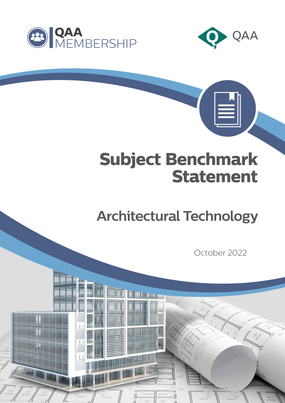The purpose of undergraduate degrees is to provide a broad base of underpinning knowledge, and the role of educational establishments is to deliver this learning theory and equip graduates with the theoretical understanding and analytical skills required to embark upon a career in a given profession.

All CIAT Accredited undergraduate programmes are required to be mapped against the QAA Subject Benchmark Statement (SBS) for Architectural Technology. The Quality Assurance Agency for Higher Education (QAA) is an independent, not for profit organisation which safeguards standards and improves the quality of UK higher education. Subject Benchmark Statements set out expectations about standards of degrees in a range of subject areas. They describe what gives a discipline its coherence and identity and define what can be expected of a graduate in terms of the abilities and skills needed to develop understanding or competence in the subject.
The QAA SBS in Architectural Technology is not prescriptive but is performance-based and allows educational establishments the flexibility to design and deliver curricula that mirror their physical and human resources. This encourages diversity and promotes innovation and creativity, whilst avoiding one size fits all.
It is also important to recognise that Architectural Technology Honours degree programmes are not taught in insolation but may be part of a suite of Built Environment programmes, such as building surveying, quantity surveying and construction management, often with common modules within their structure.
This means that Architectural Technology students will often have a broad range of underpinning knowledge across other professional disciplines, as well as specific in-depth knowledge of Architectural Technology in selected areas. The decision to run the programmes with other programmes is taken by the University.
All higher education provision must be monitored by External Examiners (or equivalent) who inspect and verify academic standards in specific subject areas. Further, as a condition of CIAT Accreditation, professional and industry input into the programme is required, and industry representatives are invited to attend Accreditation visits to offer their comments on the programme and the calibre of graduates.
Employers should recognise and acknowledge that new graduates from a full-time undergraduate degree progamme are unlikely to be 'workplace ready', particularly if they have moved directly into university from school and have had no opportunity to undertake a work placement. This situation applies within many disciplines, both inside and outside the Built Environment sector.
It is therefore important for employers to manage their expectations as to the graduate's capabilities and limitations. It is normally necessary for employers to have a work-based induction and training process in place for graduates, and for them to be able to apply the learned theory in a practical setting. It is also expected that significant work-based professional experience over a sustained period would be required in order to gain the appropriate competency in the workplace to meet CIAT's rigorously assessed practice-based learning requirements, outlined in the Institute's Professional Standards Framework (PSF).
It is for this reason that CIAT does not award professional qualifications solely based on academic achievement, because it is widely recognised that academic qualifications do not indicate work-based competence.
CIAT encourages all employers to support the mentoring and training required by the Chartered Architectural Technologists of the future. This will ensure the profile, reputation and impact of our members and affiliates are not affected or misunderstood and are respected and valued.
Click here for further information on CIAT's Accreditation process or our qualification routes.
